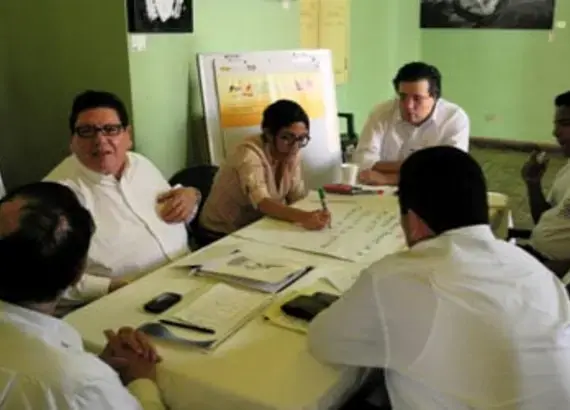
Success Story
Latin American Exchange on Violence Prevention Takes Local Ideas to International Forum
Municipal and federal government officials from El Salvador, Guatemala, Honduras and Mexico traveled to Santa Tecla, El Salvador, last month to talk about some of their successes in cutting violence in their communities, where the rates of murder, kidnapping and extortion are some of the highest in the world.
The international exchange, co-hosted by NDI, the government of Santa Tecla and the Ministry of Justice and Security of El Salvador, included discussions on municipal violence monitoring centers, protection of vulnerable populations, and strategies to incorporate citizens into the design and implementation of security policies aimed at violence prevention. Participants represented eight municipalities from the four countries, and the national government of El Salvador.
During his opening remarks, Santa Tecla Mayor Carlos Palma emphasized the importance of local responses to violence. “No national government has as much experience as local governments on the issue of prevention,” said Palma.
To learn from the experiences of Santa Tecla, participants visited local sites, such as the Colonia San Jose del Pino -- a neighborhood previously associated with gang violence and criminal activities that now offers social reintegration programs for at-risk youth. The group also met with council members to discuss their first-hand experience with violence prevention.

During a trip to a violence-monitoring center, Santa Tecla officials demonstrated how the municipality uses video surveillance to prevent and respond to crime. Participants learned how monitoring center staff use video cameras to track incidences of violence as they occur and use this information to enable the police, medical first responders, firefighters and public officials to mount coordinated responses.
Carlo Dali, the municipal cabinet coordinator from Tijuana, Mexico, emphasized the importance of introducing new programs and policies gradually, while continually evaluating their impact to identify what strategies are most effective.
Mayor Mario Fuentes of Tela, Honduras, discussed the value of forming alliances with academic institutions. He emphasized that academics can contribute thematic expertise, as well as independent evaluation of violence reduction programs.
Throughout the two-day exchange, Sept. 22-24, participants divided into working groups to discuss lessons learned and best practices for municipal violence prevention. Participants identified key elements of successful violence prevention efforts, such as better information sharing, and working closely with civil society and the private sector to formulate collaborative violence prevention and response strategies. Attendees identified and prioritized obstacles, best practices and innovative ideas to better protect vulnerable groups, including women, youth, LGBTI individuals and migrants.
“I’m confident that this experience and the knowledge gained through the exchange will be of great use to our municipality.” said Alba Chávez, a councilwoman from Siguatepeque, Honduras.
NDI recorded a summary of the exchange and a formal report will be published online.
In the coming months, NDI and local partners will continue the conversations started in Santa Tecla. NDI will share the results of the exchange with officials from other municipalities across Mexico and Central America. To facilitate ongoing discussions, NDI will also create an online library to catalogue experiences and resources on successful local violence prevention initiatives to reinforce information sharing among local governments across the region.
NDI's citizen security programs in Central America and Mexico, focus on reducing violence through the promotion of dialogue among civil society, political parties and government institutions at the municipal, national and regional levels. These programs are funded by the National Endowment for Democracy and the United States Agency for International Development.
Published October 20, 2014
